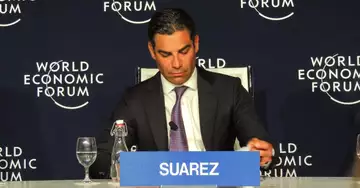DAVOS, Switzerland - In September 2021, Miami Mayor Francis Suarez said on an episode of CoinDesk TV's "First Mover" that MiamiCoin (MIA), a private cryptocurrency designed to benefit the city, has caught on faster than the popular cryptocurrency Bitcoin.
A month later, Suarez announced on CoinDesk TV that the city plans to distribute the proceeds from mining Bitcoin to its citizens, and that this could even eliminate the need for Miami residents to pay taxes. However, the mayor also warned that there should be no reason to believe that MIA would not be volatile, considering how Bitcoin has evolved.
MIA, which was developed by CityCoins, is based on the Bitcoin network and runs on the Stacks protocol, which generates MIA when people mint Stacks (STX), the native token of Stacks, and send it into a smart contract.
MiamiCoin has since crashed, losing about 95% of its value from an all-time high of about 5 cents in September 2021, according to data from CoinMarketCap.
CoinDesk spoke with Suarez about MiamiCoin's fate following a media briefing last week titled "The Future of Crypto: The View from Miami" at the World Economic Forum Annual Meeting in Davos, Switzerland.
The following text has been slightly shortened for brevity and clarity.
CoinDesk: You are an outspoken proponent of the crypto space and what it promises, especially with MiamiCoin. What do you make of the recent downturn in the crypto market? Do you have any concerns?
Suarez: You know, people ask me the same thing about Bitcoin, the fact that it has lost more than 50% of its value, but that doesn't change my feelings about the fundamental technology. For me, the interesting thing about MiamiCoin was the idea that a percentage of the mining revenue would go to the city. I just think it's a novel idea. Whether tokenomics will work is a much more complicated macro question. Ironically, the stacks that we have generated or that are deposited in a digital wallet for the city, which is about 11 million stacks, have actually generated half a million dollars worth of bitcoin that can be distributed to all of our residents equally. And that's something that we've been considering as a project. So, I think the very limited conversations that I had with some of the CityCoins folks were, look, we have a concern because when it's as inflationary as it is, you see a steep drop in price, that's what we see in a lot of tokens. That's causing people to lose confidence. I think the loss of confidence is what puts the project at risk. So if they don't want the project to be jeopardized, then they should fix it. I think they have sent the message that they are trying to fix some of the grievances. Just to put the numbers in context, I mean, in Bitcoin, only 19 million Bitcoin were issued. In MiamiCoin, 3.65 billion have been issued in less than a year. So I think they were off in this tokenomic. And that's something they need to figure out.
You told Reuters that there were some glitches related to MiamiCoin. Do you attribute the dramatic drop in value that we've seen with MiamiCoin to those technical glitches?
I mean, I can't say for sure, but it seems like with that kind of money supply, people are selling more than they're buying, and that's what usually causes the price to drop.
Where does MiamiCoin stand right now - what are the adoption numbers like?
I don't.
What do you think is next for MiamiCoin?
I have seen some benefits. I have seen some conferences in terms of creating usage. I think CityCoins is also trying to fix some of the economics to see if they can stabilize the price from what I've read and seen in terms of some of the things they've released. I think if those things happen, then we will see. I mean, we used $5 million for a rent stabilization program to help people whose rent has gone up more than 20%. Then there's $11 million in a digital wallet that generated half a million dollars in bitcoin, and our intention was to distribute that. We'll see how that all plays out before we make a final decision.
You said MiamiCoin was an idea.
That's right. Right.
Are you maybe talking to other politicians and mayors about how it could be implemented in other states or cities?
You should talk to CityCoins. They are the ones who have the mining equipment. They have also created more coins.
Are you also pushing for this idea of a city coin to be implemented in other places?
I'm not pushing anything. I talk about the facts, that's what I do.

